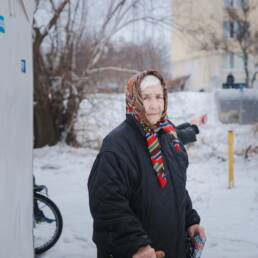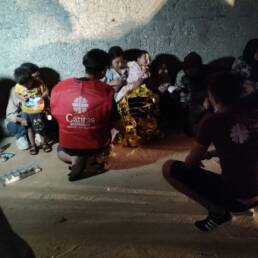On this World Refugee Day, Caritas Europa calls for a Europe that ensures access to protection in its territory through an improved asylum system that puts people’s rights at the centre. This starts with ensuring safe and regular pathways to protection, dignified reception conditions, and integration in the host society.
Globally, close to 110 million people lived forcibly displaced in 2022 due to war, violence and conflict, or natural disasters. This staggering figure includes the millions of people who fled the war in Ukraine or who left Venezuela due to a combination of political, socio-economic, and humanitarian crises or who either left the Democratic Republic of the Congo or were internally displaced in the country due to attacks by armed groups. Within the EU, Syrians and Afghans remained the top two nationalities to have lodged an asylum application in 2022.
To flee and leave everything behind is often not a choice but the only option for a safe future. It is therefore not surprising that the UN’s theme for this year’s World Refugee Day is “Hope away from home”.
But to reach a safe place often entails embarking on a dangerous journey. The tragic shipwreck of an overcrowded fishing boat that capsized and sank off Greece on 14 June is the latest example. Had safe and regular pathways to protection been available, the lives of at least the 79 people who drowned, and possibly of the hundreds more who are missing, could have been saved. Already more than 1,000 people have died in 2023 in the Mediterranean Sea.
There is no time to lose in guaranteeing safe and regular pathways, such as resettlement and humanitarian visas, for people seeking protection and in eliminating the widespread pushbacks and violence they experience on a too regular basis during their journeys.
Caritas Europa calls on European governments to preserve access to their territory and to the right to asylum. Regrettably, the ongoing reform of the EU’s asylum system seeks to prevent this access, to keep people in need of protection in the border countries while their protection claims are being processed and to enforce prompt returns.
We are concerned that this will lead to widespread detention and overcrowded camps at the EU’s external border, as we have seen in the past with the undignified reception conditions on the Greek islands, like Moria.
European governments must respect their responsibilities under international refugee law by ensuring efficient asylum procedures and dignified reception conditions. We also expect them to pledge an ambitious number of resettlement places – a crucial life-saving tool to bring refugees to a country where they will receive long-term protection – and to then adequately implement their commitments.
We urge European leaders to preserve access to asylum in Europe and to ensure safe pathways for people in need of protection. Enough lives have already been lost. A strengthened asylum and reception system must provide adequate protection and support. Investing in welcoming societies is key to build “hope away from home” and to allow refugees to flourish in their new home.
Maria Nyman, Secretary General Caritas Europa
Reaching a country where one can ask for asylum is only the first step on a long journey before being able to fully participate in and contribute to the host country’s society. As we have already identified in our briefing paper, the triggering of the Temporary Protection Directive for refugees from Ukraine is an example of strong political will to welcome people in the EU.
Now it is time to build on this solidarity and to duplicate the good practices to ensure not only a dignified welcome but appropriate protection and access to basic rights and services for all people in need of protection, regardless of their country of origin.
More information
Leïla Bodeux
Senior Policy and Advocacy Officer
Tel: +32 (0)2 235 26 55
Mob: +32 (0)478 585 409
lbodeux@caritas.eu
Susan Dabbous
Media Officer
Tel: +32 (0)2 235 03 94
Mob: +32 (0)478 58 54 35
sdabbous@caritas.eu




